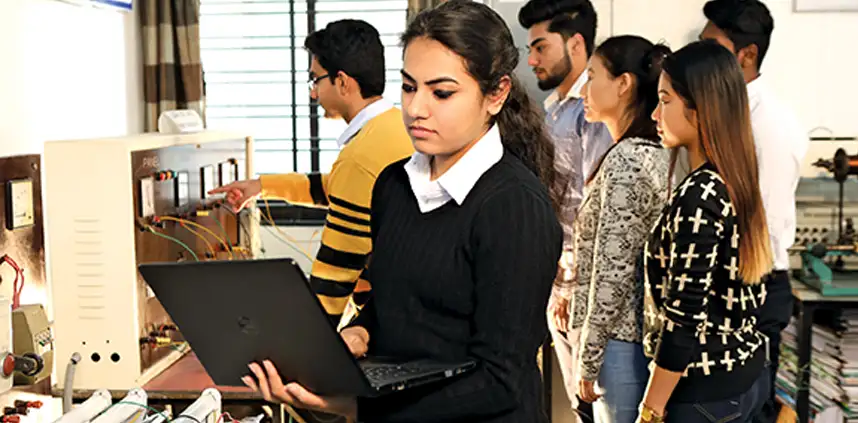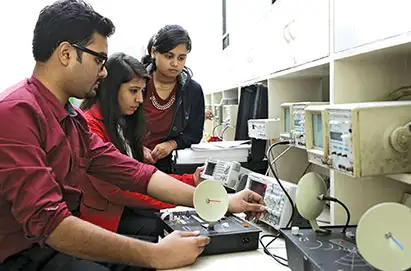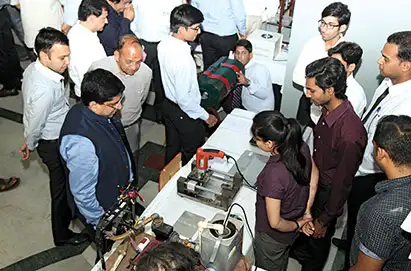Programme Overview
M.Tech in Electronics and Communication Engineering (ECE) is an innovative postgraduate programme that enables students with technical skills and knowledge in areas related to making careers in emerging fields such as wireless communication, chip design, embedded computing, and next-generation electronics. Two of the most in-demand specializations are offered through the programme: Communication Systems and VLSI Design & Embedded Systems.
This rigorous two-year program merges comprehensive theoretical foundations with practice-oriented training in industry areas. Students are exposed to a well-rounded curriculum with cutting-edge modules like MIMO systems, 5G communications, FPGA/ASIC design, embedded software development, and real-time operating systems. With practical exposure in industry-level labs and project-based learning, the M.Tech ECE program trains future engineers who can address real-life issues in the communication and electronics domains.
Whether next-generation chip design or next-generation wireless networks, this M.Tech course trains students to contribute towards innovation in the domain of telecommunications, embedded systems, semiconductor design, and allied areas.
Programs Offered:
The Faculty of Engineering and Technology at Manav Rachna has postgraduate programs with a mission to foster experience in newer, emerging fields in electronics and communications. The courses are well-suited to render students excellent learning, cutting-edge practical training, and possibilities for specialisation best suited for contemporary industry and cutting-edge technological fronts.
Emphasis is on building a strong foundation in hardware and software aspects of electronics systems through foundation and elective courses. The students are given the flexibility to choose their area of interest based on their career ambitions and interests, hence making the programme more student-centric and flexible.
Postgraduate Programme Offered:
M.Tech – Electronics and Communication Engineering (ECE) with Specialisations in:
- Communication Systems
- VLSI Design and Embedded Systems
The specialisation in Communication Systems is intended to build expertise in the design and analysis of next-generation wireless, optical, and satellite communication networks. The VLSI Design and Embedded Systems track emphasizes semiconductor device engineering, digital IC design, and real-time software development for embedded solutions.
This curriculum addresses high-tech requirements and interdisciplinarity of modern electronics engineering. Students offer practical training through projects, labs, and simulation tools while learning theoretical concepts that serve as the foundation of next-generation ECE technologies. The integrated framework allows students to create an integrative concept and apply it appropriately in engineering contexts.>
Duration: 2 yrs. (4 Semesters)
Manav Rachna's M.Tech in Electronics and Communication Engineering is a methodical two-year postgraduate course of study aimed at engineers and science graduates looking to specialize in communication technologies or semiconductor and embedded system design. The course is planned to bridge the gap between theoretical education and industry requirements by incorporating hands-on training, industry-specific modules, and emerging technology areas.
The scholar's curriculum consists of intense coursework, state-of-the-art laboratory experimentation, co-research, and actual projects. Communication Systems specialisation covers topics such as wireless technology, digital modulation, signal processing, and high-speed networking. VLSI and Embedded Systems specialisation covers topics like microelectronics, embedded programming, ASIC/FPGA implementation, and hardware-software co-design.
Ranging from chip-level design and RF communication to embedded computing and signal processing, the course assures students job-ready capabilities in industry and research settings. With the guidance of advanced tools such as MATLAB, Cadence, ARM Cortex, and Xilinx, the course covers a mixture of core and advanced electives on both streams to make learners industry-capable and innovation-capable. Students are also encouraged to be involved in team research projects, help write technical reports, and partake in interdisciplinary study paths in order to widen their skill base.
.png)

 0
0 





























